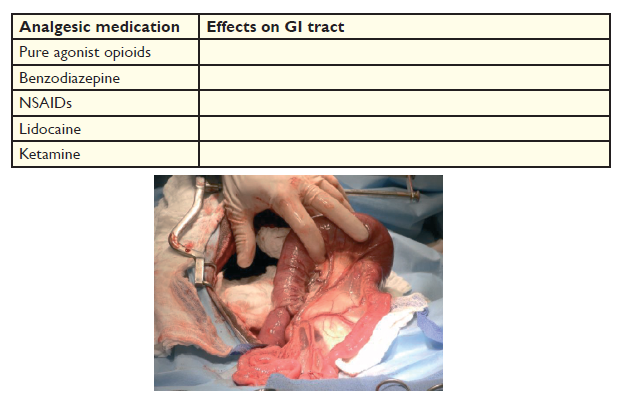Small Animal Emergency and Critical Care Medicine: Self-Assessment Color Review, Second Edition, Q&A 13
Jump to navigation
Jump to search

| This question was provided by CRC Press. See more case-based flashcards |

|
Student tip: This case is providing an excellent image. |
| Question | Answer | Article | |
| Fill in the chart above listing analgesic medication pertaining to the effects of the drug on the GI tract. | Pure agonist opioids: May reduce motility but may counteract pain-associated ileus. Benzodiazepine: Not an analgesic. NSAIDs: Reduces prostaglandin protection of gastric and proximal duodenal blood flow, whch can result in ulceration. Lidocaine: No direct effect, but may improve motility with pain-associated ileus. Ketamine: May modulate effects of ischemia–reperfusion injury of the mesentery.
|
Link to Article | |
| Surgery on a dog reveals a jejunal intussusception (pictured above). The affected segment is purple in colour. How do you determine the viability of the tissue? What are the limitations to
visual inspection? |
The mesenteric vessels providing blood flow are palpated for pulses. The affected segment is observed for evidence of peristalsis. Marginal arteries in the serosa can be incised and observed for bleeding. However, the dark color may be due to transient venous congestion, and the bowel could appear to have normal perfusion in early arterial occlusion. Hypotension and vasospasm could also result in temporary lack of blood flow. Remember that peristalsis can be observed in ischemic bowel.
|
Link to Article | |
| Why should this segment be removed en bloc and not reduced? | Reducing the intussusceptions can result in release of mediators of inflammation and ischemia–reperfusion injury into the general circulation, leading to shock and potential cardiac arrest.
|
Link to Article | |
| What is the holding layer of the ventral abdominal incision closure? What size and type of suture do you select for abdominal wall closure in this 25 kg dog? | External fascia of the rectus abdominus muscle. The linea is opposed using a 2-0 monofilament non-absorbable suture in a simple continuous or interrupted pattern. The subcutaneous layer is opposed using a 2-0 absorbable monofilament suture in a simple continuous pattern. The cutaneous layer is opposed with either a subcuticular 2-0 monofilament absorbable in a simple continuous pattern or a cutaneous closure using 2-0 or 3-0 monofilament non-absorbable suture in a continuous or interrupted pattern.
|
Link to Article | |
To purchase the full text with your 20% off discount, go to the CRC Press Veterinary website and use code VET18.
